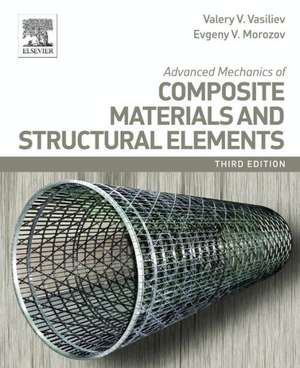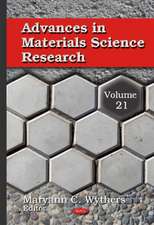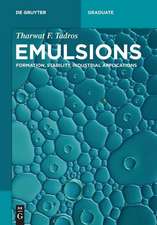Advanced Mechanics of Composite Materials and Structural Elements
Autor Valery V. Vasiliev, Evgeny V. Morozoven Limba Engleză Hardback – 3 iul 2013
The third edition of the book consists of twelve chapters progressively covering all structural levels of composite materials from their constituents through elementary plies and layers to laminates and laminated composite structural elements. All-new coverage of beams, plates and shells adds significant currency to researchers.
Composite materials have been the basis of many significant breakthroughs in industrial applications, particularly in aerospace structures, over the past forty years. Their high strength-to-weight and stiffness-to-weight ratios are the main material characteristics that attract the attention of the structural and design engineers. Advanced Mechanics of Composite Materials and Structural Elements helps ensure that researchers and engineers can continue to innovate in this vital field.
- Detailed physical and mathematical coverage of complex mechanics and analysis required in actual applications – not just standard homogeneous isotropic materials
- Environmental and manufacturing discussions enable practical implementation within manufacturing technology, experimental results, and design specifications
- Discusses material behavior impacts in-depth such as nonlinear elasticity, plasticity, creep, structural nonlinearity enabling research and application of the special problems of material micro- and macro-mechanics
Preț: 713.88 lei
Preț vechi: 1025.30 lei
-30% Nou
Puncte Express: 1071
Preț estimativ în valută:
136.67€ • 142.06$ • 113.31£
136.67€ • 142.06$ • 113.31£
Carte tipărită la comandă
Livrare economică 31 ianuarie-14 februarie 25
Preluare comenzi: 021 569.72.76
Specificații
ISBN-13: 9780080982311
ISBN-10: 008098231X
Pagini: 832
Ilustrații: 500 illustrations
Dimensiuni: 191 x 235 x 43 mm
Greutate: 1.86 kg
Ediția:Revised
Editura: ELSEVIER SCIENCE
ISBN-10: 008098231X
Pagini: 832
Ilustrații: 500 illustrations
Dimensiuni: 191 x 235 x 43 mm
Greutate: 1.86 kg
Ediția:Revised
Editura: ELSEVIER SCIENCE
Public țintă
Graduate researchers and above studying composite mechanics. Practicing engineers in industry, including members of ASME, AIAA and SAE; aerospace and automotive engineers designing and analyze composite materials.Cuprins
1. Introduction
2. Fundamentals of mechanics of solids
3. Mechanics of a unidirectional ply
4. Mechanics of a composite layer
5. Mechanics of laminates
6. Failure criteria and strength of laminates
7. Environmental, special loading, and manufacturing effects
8. Laminated composite beams and columns
9. Laminated composite plates
10. Thin-walled composite beams
11. Circular cylindrical shells
12. Optimal composite structures
2. Fundamentals of mechanics of solids
3. Mechanics of a unidirectional ply
4. Mechanics of a composite layer
5. Mechanics of laminates
6. Failure criteria and strength of laminates
7. Environmental, special loading, and manufacturing effects
8. Laminated composite beams and columns
9. Laminated composite plates
10. Thin-walled composite beams
11. Circular cylindrical shells
12. Optimal composite structures
Recenzii
"This graduate textbook introduces the traditional approaches to engineering the mechanics of structures made from the new composite materials that are very high in strength and stiffness in proportion to their weight… Previously published as Advanced Mechanics of Composite Materialsin 2007, the third edition adds four chapters on composite beams, plates, and cylindrical shells." --ProtoView.com, February 2014
"The third edition of the book consists of twelve chapters progressively covering all structural levels of composite materials from their constituents through elementary plies and layers to laminates and laminated composite structural elements. All-new coverage of beams, plates and shells adds significant currency to researchers." --MaterialsToday.com, December 16, 2013
"The third edition of the book consists of twelve chapters progressively covering all structural levels of composite materials from their constituents through elementary plies and layers to laminates and laminated composite structural elements. All-new coverage of beams, plates and shells adds significant currency to researchers." --MaterialsToday.com, December 16, 2013








